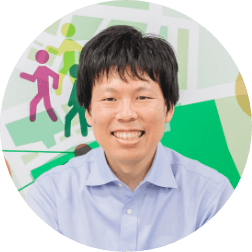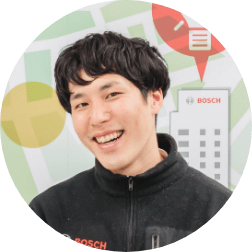Three mid-career hires share their true thoughts
— What has changed since changing jobs from Japanese companies to Bosch?

Yasuhiro Morita
Systems Engineering & Technical Strategy Department
EE Architecture and Connected Technology Trend Research

Kenta Kojima
Two-Wheeler & Powersports Business Unit
ECU Component Development Department, ECU Component Development Group 1
Platform Semi-Active Damping Control Project Manager

Ayana Sato
Global Business Service Japan, HR Shared Service
Talent Acquisition
Talent Acquisition Manager

Desire to broaden career in a global environment. Joined Bosch in search of new possibilities.

Please tell us about your background and why you decided to join Bosch.
Morita: I was engaged in wireless research and development at my previous job at an electronics manufacturer. After that, I wanted to know how that technology was connected to business, so I transferred to the business department as a system engineer. I was blessed with opportunities to meet talented engineers from overseas, but I realized that development teams in the business divisions of Japanese companies tend to be confined to Japan, and there are few places where I can work with the overseas engineers I met. When I was looking for an organization where I could develop technology together with overseas engineers on a daily basis from a Japan perspective, I felt that Bosch could make it happen, which is why I joined the company.
Currently, I feel that my role is to convey to Japanese customers the technologies that have been honed by talented people around the world, based on a discerning eye for technology that I have cultivated over the years. My perspective has changed from before, and now I am able to work from a global perspective, such as being able to introduce not only overseas technical capabilities, but also case studies of the implementation of technologies overseas.
Kojima: Yasuhiro Morita was a specialist in wireless technology. My previous job was at an automobile manufacturer. I was in charge of everything from concept design to actual evaluation in a department related to safety. I was involved in the development of several car models and I think I was able to learn the entire range of technologies related to automobiles. However, rather than continuing in the same job, I decided to change jobs because I wanted to expand the scope of my career by making use of my knowledge of electronics and automobiles.
Morita: I understand that feeling. Like Kenta Kojima, I also chose a company because I wanted to learn about my own value, which I could see by broadening my horizons. Did you get the impression that Bosch was different from other Japanese companies?
Kojima: From the interview stage, I was able to talk with the person in charge. I did not feel like I was being tested, which is typical of interviews, and Bosch listened with interest to my experience. Originally, I was interested in Bosch's high technical capabilities and development capabilities, but when I heard that Bosch also has a good work-life balance, I wondered how they managed to balance the two. I had worked tough at my previous place of employment, so I hoped also that I could improve the way I worked.
Since Bosch is headquartered in Germany, I felt that it was also an advantage that I could work overseas. In particular, the Two-Wheeler & Powersports Business Unit (2WP), to which I belong, has a development platform in Japan, so I can work globally while staying in Japan. I think that the experience of working in parallel with overseas members with the same perspective will become an indispensable strength in the future.

Sato: Both of you thought that because Bosch is headquartered overseas, it would lead to global business and a wide range of careers. Unlike the two of you, I did not have experience in the technical field. I joined Bosch after working for a general trading company as a new graduate, and then at a consulting firm.
When I was a new graduate, I was looking for a job from the standpoints of "challenging culture", "large social impact", and "diversity". I joined a general trading company with which I had a connection. While learning business at the general trading company, I realized that I was interested in "people", or human resource management, among other management resources. So, I changed my job to become a consultant in the field of human resources and organizational management. After working as a consultant for three full years, I decided to change jobs to a business firm because I wanted to be involved directly in long-term organizational and human resource growth, in a way that I was not a third party.
I was attracted to Bosch because it has a global environment even though it is located in Japan, and because it is a leading company in the industry. In addition, unlike other companies, Bosch interviewed me positively even though I was from another industry and had no experience in human resources. I decided to join Bosch because I felt a strong desire to work at a place where the company was really changing and would continue to change in the future. Furthermore, the vice president of Bosch at that time was a Japanese woman (currently retired), so I felt confident that my career possibilities would not be restricted by gender or nationality.
Contrary to the image that "foreign-affiliated company = dry", Bosch has a warm corporate culture that respects what individuals want to do.

How has your impression of Bosch changed since you joined the company?
Sato: I feel that Bosch is a company that has a spirit of exploration for technology, and a spirit of exploration for people. It is a prerequisite to succeed as a business, but there are many people who work with a truly pure feeling, such as "I like the technology and the products".
Morita: Without giving up on ideals or compromising on reality, they accept being pure. I think one of Bosch's strengths is that we can challenge each of our aspirations in a variety of ways to meet our individual needs.
At a town hall meeting (a place for dialogue between management and associates), I voiced my opinion directly to management. After a moment of silence, my manager quickly replied, "Let's do it." I feel that there is a culture that truly accepts the opinions of associates, not just as a formality.
Kojima: There is no doubt that Bosch is a company where you can do what you want to do. For example, if you tell the people involved that you want to be in charge of your favorite car model, they will respond flexibly. They take a long-term view of new challenges, even those with small potential, which is different from the image of foreign-affiliated companies that want to deliver results in a short period of time.
Sato: For me, who had never worked at a manufacturer, I find it refreshing that Bosch values not only its intangible assets, such as its technological capabilities, but also its fixed assets, such as its factories, and the people who work there, including each and every associate. I feel that this is why a culture of nurturing associates from a long-term perspective is deeply rooted in Bosch.
There are probably many people who may feel that using English in business is a high hurdle to overcome.
Sato: I understand the anxiety. Since I had no work experience in English, I signed up for English conversation lessons just before the English interview during the hiring process. I got through it by practicing. When I joined Bosch, I found that there are not many native English speakers, so I think that essential communication skills are more important than fluency, correct grammar, and clear pronunciation when communicating with global members.
Kojima: I didn't use English in my previous job either, so I was worried until I joined Bosch. When I started working, the conversations between engineers were in English, so of course it was difficult at first, but I think that I learned quickly because I had many opportunities to use English.
Morita: At first, I was at a level where I didn't understand what was being talked about. I think everyone is like that. You will get used to it in a few months, and as long as you get the key points of the conversation, you will be fine.

Kojima: Business English has standardized phrases, so if you use them when you speak, there should be no problem. As Ayana Sato has said, English is not the native language of the overseas members, such as those from Germany, China, and India, so we communicate with each other while trying to understand what the other person wants to say.
Rather, I think that communication skills (soft skills) such as "having a conversation in English that gets to the core of the matter" is more important than language skills that come naturally. Sometimes it is necessary to backtrack from conversations that have digressed with overseas members, and improve conversational skills to push toward the ultimate goal.
Sato: When someone asks, "Is it okay?", be honest and tell them if it is not okay. It is a skill to be able to proceed with talks so that there are no discrepancies in recognition. Certainly, it may be a skill that is more important than language skills.
Valuing career and family. A culture that praises each other's strengths also raises self-esteem.

On the other hand, have you ever thought that it seems like a foreign-affiliated company?
Morita: Not only is English spoken all around, but the loudness of the voices at first made me think, "This is a global company." There is no seniority system at all, and associates who are able to do their jobs well are progressively advancing in their careers, just as I had imagined. In addition to being functional and convenient, the office is also characterized by a sense of playfulness here and there, such as a café, and a wall where associates can write freely.
Sato: This is related to the English topic I mentioned earlier, but the fact that many of the learning contents are not about "learning English" but about "learning leadership in English" made me feel that this is a foreign-affiliated company that views English just as a means to an end. I was a bit puzzled at first because all the in-house systems are in English, but once I got used to it, I gained language skills and I was able to achieve two things at the same time.
Kojima: The members in each location are really close to each other, and you can quickly reach out to experts, and when you have meetings with people in different time zones, you realize that we are a global company. There are members with various backgrounds, and they are all very helpful. I think this may be a feature of Bosch, rather than a characteristic of a foreign-affiliated company.
Morita: The members will also tell you about advanced technologies overseas as soon as you ask them by e-mail. Moreover, they are so kind that if you ask one question, you will receive ten responses. There is a wide range of knowledge gathered within the company, so it is as if external consultants are gathered within the company. I think this is also another of Bosch's strengths.
Since joining Bosch, has anything changed in your personal life or mindset?

Sato: I am now able to express my opinions with confidence. Bosch focuses on individual strengths in management, and the culture of praise is so deeply rooted that not only associates but also management proactively say thank you. Also, my boss asked me immediately after joining the company, "What do you want to do next?" which strengthened my awareness that I am the one who chooses my own career.
Morita: The advantage of Bosch is that you can choose your own career, so you can not only fully commit to your work, but also focus on your private life and work in a well-balanced manner. A big change I feel is that my children, who are in elementary school, have become interested in Germany. They have experienced different cultures at Bosch, such as talking to Executive Vice President and Director Christian Mecker dressed as Santa Claus at a Bosch event for families.
Kojima: There is a culture that also values the career of associates who have families. I have just returned to work after taking childcare leave, and I am grateful to be able to work from home. Perhaps because I continue to be able to have meals with my family, people around me have told me that I have become calmer recently.
Sato: I certainly feel that people may have a softer personality because the atmosphere of the company is good.
Kojima: I think there are some jobs that can be done by pushing yourself to "just do it", but there is a deeply rooted sense of values that pressure does not get the job done. A calm atmosphere that makes you think, "I can't do it, so what should be done?" was a bit of a culture shock.
It is precisely because the industry is in a period of change that there are opportunities to play an active role. We are not just one location in the world, but fulfill a role that only we can offer.

What position will Bosch in Japan take in the future?
Morita: I think we must always keep a global perspective and ask how we can introduce this into Japan. The automotive industry is undergoing a period of global transformation, and Japan in particular is at the forefront of change, with pressing social issues to address. There is a great sense of crisis, but that is why there must be solutions that can only be built from the perspective of Bosch Japan. The construction of a new Bosch Group R&D facility (FUSION Project), which is being carried out as a public-private partnership, also shows the high expectations from Germany.
Sato: I myself joined Bosch not out of a love of automobiles, but rather out of a desire to do work that will have an impact on society as mobility, which is the infrastructure of society, is at a turning point. Due to the timing of these big changes, the necessary human resources are also diversifying, and I believe that experiences like mine, coming from a different industry, can also be utilized. Kenta Kojima, don't you feel firsthand that we are in a period of change?
Kojima: There has never been a time when the industry is changing so much. With the shift to EVs and automated driving, we have entered an era in which the conventional automobile business will not work as it is, and that is why we need to think about how to change. Will the changes taking place in Europe and China also come to Japan, or will we be able to approach them from a completely different perspective? The question will be how to connect the many hands that Bosch has around the world.
As a senior member, do you have a message for those who are thinking of joining Bosch?
Morita: What is important is to take the initiative and be willing to take on challenges. In this period of rapid change, opportunities for success are expanding. If you make the most of the assets of Bosch, you will have the chance to change the business of the future at your own will. I would like to tell you that this is not the time to hesitate in applying (laughs).
Kojima: Bosch in Japan is essentially one of Bosch's locations around the world. However, the dynamic activities that are taking place here, such as the construction of a new R&D center and the operation of new production lines, are the result of each and every one of us thinking about how we can make the most of our strengths. I would like to work with people who take the initiative and express what they want to do in order to enhance our own presence, rather than just being a location or point of contact that only does what the head office in Germany tells us to do.
Sato: Bosch does not have the competitive atmosphere that is often imagined in foreign-affiliated companies. I believe that precisely because many people work together to create large products such as automobiles, that a culture of sincerity and working together with those around us is deeply rooted in Bosch. We welcome people who have the mindset of thinking about what they can do for the team, while valuing what they like and are interested in. Even if you have a background in another industry or business, as I did, it is fine because our organization is one where people can make the most of that perspective!

*Information contained in this article is current at the time of the interview. (Published on March 22, 2023)









